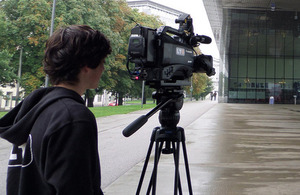UK Statement to the OSCE on Freedom of Expression and Freedom of the Media
Organization for Security and Co-operation in Europe holds its Human Dimension Implementation meeting, Warsaw, Poland

Working Session 4: Freedom of Expression and Freedom of the Media
25 September 2013
I fully subscribe to the remarks made by Sweden on behalf of the European Union but would like to add some remarks from our national perspective.
The UK supports freedom of expression and freedom of the media as fundamental human rights which lie at the heart of our priorities as a government. We applaud the vigorous and resolute efforts of the Representative on Freedom of the Media and her team as an outstanding example of international advocacy, not least their diligence in holding all participating States to account - including the UK - and we welcome her challenges as both proper and fair.
We strongly support the Representative’s autonomous mandate and we call on participating States to ensure that it remains broad-ranging and free from interference.
Last year’s UN Human Rights Council Resolution on the safety of journalists set the international standard for their protection. It is important that we follow this example in the OSCE. Evidence from the Representative herself and elsewhere shows that in many OSCE countries journalists, including bloggers and social media activists, continue to be attacked, harassed or worse, for exercising their freedom of expression. We need, as States, to demonstrate our collective determination to halt such behaviour.
Digital technology is now part of our everyday lives. It is an enabler for the enjoyment of many human rights, including freedom of expression, freedom of the media, and freedom of assembly. As an active member of the Freedom Online Coalition, we work to safeguard freedom of the internet and draw attention to those countries who fail to do so.
We acknowledge that digital developments and a constantly changing media landscape can present challenges to governments. There are sometimes tensions between freedom of expression and combating hate speech online. But such challenges can be overcome by adhering to human rights obligations enshrined in international law. It is time for OSCE states to acknowledge that human rights should apply with equal force online as they do in the off-line world. This simple concept was expressed in last year’s landmark UN Human Rights Council Resolution, and was clearly and powerfully articulated in the US-initiated draft declaration on Fundamental Freedoms in the Digital Age. We strongly endorsed this initiative and call on others to pledge their support.
In conclusion, we call on participating States to work cooperatively to protect and promote freedom of the media in all its forms. This is sometimes presented as a divisive topic where one group of States is seeking to preach to others. It need not be this way. Last year’s resolutions in Geneva demonstrate that consensus can prevail.
We commend the Ukrainian Chairmanship for their intention to table a media freedom decision at this year’s Ministerial Council. We hope that we can overcome our differences and take steps to protect and foster this most fundamental of human rights. Thank you.
Follow us on Twitter: @UKOSCE